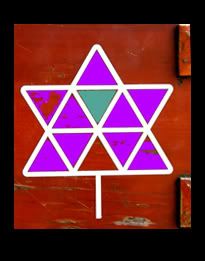Why Do We Dance?
Erik Hoffman "Contradictations"
Chapter 1: Why Do We Dance?
In past cultures the people's dance was far more connected to their experience of the universe. Many cultures believed if they didn't dance, the harvest would fail, the rain would not come, the sun would fail to rise, or the community would dwindle and die. When I'm leading a walk through for a dance, I often joke about how a figure used to be a part of a fertility rite. Actually, this is not a joke. Communities used to be small. Transportation did not permit distant travel, therefore, you knew your neighbors. People died younger and many young ones did not survive. A community's life depended on abundant harvest, both of crops and babies. The fertility of the community was its preservation.
Now we live a different life. Our communities are often based on common interests, no matter how spread out we are. Our modes of travel make distances small. The local community no longer holds the same importance in our lives. Most likely we don't know our neighbors. Harvest is a name brand we buy at the store. The old rites no longer hold the same significance.
We need a new reason to perform our rituals. Often these are exercise, camaraderie, contact, love of the music, love of the dance, and enjoyment of the communal experience. Fertility does not hold the same importance. I would venture to say we could use zero or even negative population growth rites!
Still, the question, why do we dance, continues to plague me. I have done a limited exploration, and two of the most commonly stated reasons are: first, a sense of spirituality in the dance, and second, love of the music.
In my first book, Contra Comments, I wrote about the connection between music and dance. Now, with spirituality in mind, I'd like to share some of my thoughts on why people dance.
All people seek to alter their state of consciousness. The means of doing this are myriad: drugs, food, exercise, sex, trying dangerous things, singing, chanting, sleep, meditation, and dance, to name only a few. Spiritual pursuits alter and expand our consciousness by prayer and meditation. Forms of meditation include singing, playing music, and dancing. It seems that altering consciousness is a distinctly natural thing to do.
One state we humans seek is the state of, "no thought." In this state we are, "in the moment," it is a form of trance. It feeds the spirit, lifts us to new awarenesses, and feels good! Dance and music tend to bring us to this state. During repetitive motion in time to the rhythm of music, the body can take over, and the brain can be put on hold. All forms of dance seem to engage in this. Folk dances were carried out by the local people who grew up knowing the steps. If you grow up with the dance, it's easy to do the movement without thought because you gain "body knowledge." When the body knows the motion, the brain can turn itself off. Numerous repetitions induce the trance. Even "art dancers" engage in this state; dancers practice the movements they need to perform on stage in minute detail over and over, so that when they finally dance for an audience, they can do it in this no-thought state.
In contra dance, we use a very basic step: walking in time to the music. While walking, we carry out various figures with other dancers. We learn the pattern of the dance by listening to the caller. There are relatively few figures, and most are easy, with a smooth and natural flow. In modern contras this is taken to a greater extreme by choreographing dances such that the transition from one figure to the next maintains this flow. It's easy to learn, and it's easy to connect with others. As we learn the figures and become attuned to the caller, we can stop thinking, letting the caller take that initiative. This frees us to simply move in time to the music, and revel in the connections with our fellow dancers.
So, I think one main reason we dance is to attain this no-thought state while enjoying the contact of many wonderful people. Do not discount this concept! The no thought state, the trance, is very important to our well being, and dance is a vehicle that can lead us to this place.

No comments:
Post a Comment